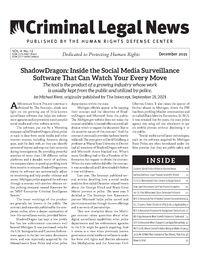The tool is the product of a growing industry whose work
is usually kept from the public and utilized by police.
by Michael Kwet, originally published by The Intercept, September 21, 2021
A Michigan State Police contract, obtained by The Intercept, sheds new light on the growing use of little-known surveillance software that helps law enforcement agencies and corporations watch people’s social media and other website activity.
The software, put out by a Wyoming company called ShadowDragon, allows police to suck in data from social media and other internet sources, including Amazon, dating apps, and the dark web, so they can identify persons of interest and map out their networks during investigations. By providing powerful searches of more than 120 different online platforms and a decade’s worth of archives, the company claims to speed up profiling work from months to minutes. ShadowDragon even claims its software can automatically adjust its monitoring and help predict violence and unrest. Michigan police acquired the software through a contract with another obscure online policing company named Kaseware for an “MSP Enterprise Criminal Intelligence System.”
The inner workings of the product are generally not known to the public. The contract, …
by Jayson Hawkins
In the first years of the 21st century, exonerations of men and women who had served decades for crimes they did not commit made national news, both because of the terrible tragedies they represent and because they were so rare. In recent years, exonerations have …
by John McWhorter, Quillette.com
Tony Timpa was 32 years old when he died at the hands of the Dallas police in August 2016. He suffered from mental health difficulties and was unarmed. He wasn’t resisting arrest. He had called the cops from a parking lot while intoxicated because he thought he might be a danger to himself. By the time law enforcement arrived, he had already been handcuffed by the security guards of a store nearby. Even so, the police officers made him lie face down on the grass, and one of them pressed a knee into his back. He remained in this position for 13 minutes until he suffocated. During the harrowing recording of his final moments, he can be heard pleading for his life. A grand jury indictment of the officers involved was overturned.
Not many people have seen this video, however, and that may have something to do with the fact that Timpa was white. During the protests and agonizing discussions about police brutality that have followed the death of George Floyd under remarkably similar circumstances, it is too seldom acknowledged that white men are regularly killed by the cops as well, and that …
by Michael Fortino, Ph.D.
By the time Denver Police Department (“DPD”) officers handcuffed Anthony Sleets on July 7, 2021, he was already having a bad day. He had passed out in a hotel parking lot after what he thinks must have been an assault—he awoke to find he’d …
by Douglas Ankney
The Supreme Court of Colorado affirmed a decision of the Court of Appeals (“COA”), holding that a warrantless surveillance and recording of a home’s curtilage and private, fenced-in yard via a pole camera for over three months was an illegal search.
A confidential informant …
by Casey J. Bastian
When a white Minneapolis police officer killed George Floyd, videos of the callous act went viral. The event prompted a seemingly unprecedented wave of racial justice and anti-police protests that have continued since that day May 2020. Millions of protestors took to the streets. …
by Douglas Ankney
The Supreme Court of Minnesota announced that the two-year time limit set forth in Minn. Stat. § 590.01, subd. 4(c) to file a timely postconviction petition under the retroactive new interpretation of law exception in Minn. Stat. § 591.01, subd. 4(b)(3) runs from the date …
by Anthony W. Accurso
Reporting from Wired shows how researchers at Johns Hopkins University looked into vulnerabilities in Apple and Android phones and how they can be exploited by groups like law enforcement and other government actors.
Cryptographers at Johns Hopkins analyzed the current state of encryption, …
by Douglas Ankney
The U.S. Court of Appeals for the First Circuit held that the U.S. District Court for the District of New Hampshire erred by refusing to allow Louis Gardner to withdraw his guilty plea after allowing the Government to withdraw from the plea agreement due to …
by Anthony W. Accurso
A bill introduced in mid-April by Ron Wyden (D-OR), Rand Paul (R-KY) and 18 other U.S. Senators would make it illegal for law enforcement and intelligence agencies to purchase Americans’ sensitive information—including geolocation data or the content of communications—from any company that collects such …
by Douglas Ankney
The Supreme Court of Wisconsin affirmed the decision of the Court of Appeals (“COA”) that had held the incapacitated driver provision of Wisconsin’s implied consent statute, Wis. Stat, § 343.305(3)(b), is unconstitutional because the provision’s “deemed” consent authorizes warrantless searches in violation of the Fourth …
by Casey J. Bastian
The desire to implement significant reforms in American policing, particularly in metropolitan areas, is not new. However, the specific demand to literally defund the police is a nascent concept. Contemporary reform advocates assert that the enormous funding provided to law enforcement agencies should instead …
by Douglas Ankney
The Supreme Court of Washington reversed the convictions of Jessica L. Vazquez after holding that her attorney, Sarah McFadden, was ineffective under the Sixth Amendment for failing to object to the introduction of inadmissible evidence at trial.
Detective Colby Martin and Officer Daniel Vargas …
by Casey J. Bastian
For many Black Americans, the thought of calling the police for help is not an option. Most won’t request assistance from law enforcement unless there is a truly violent crime occurring. Minor situations are frequently escalated and end with unnecessary police violence and brutality. …
by Douglas Ankney
The Supreme Court of Michigan held that time served in prison due to revocation of parole that resulted solely from a wrongful conviction of other offenses is not excluded from compensation under the Wrongful Imprisonment Compensation Act (“WICA”), MCL 691.1751 et seq.
In 1987, …
by Douglas Ankney
The Supreme Judicial Court of Maine reversed the denial of Bruce Akers’ motion to suppress and vacated his murder conviction.
On June 9, 2016, Akers called the local sheriff’s office and spoke with the sergeant. He told the sergeant he suspected his neighbor of …
by Dale Chappell
The U.S. Court of Appeals for the D.C. Circuit joined seven other circuits and held that a compassionate release motion filed by a prisoner under 18 U.S.C. § 3582(c)(1)(A) is not subject to the policy statement in U.S. Sentencing Guidelines Manual (“USSG”) § 1B1.13, after …
by Douglas Ankney
In a case of first impression, the Supreme Court of New Jersey announced the framework that governs when a party requests a criminal history check on a prospective juror to determine whether the juror is eligible and to ensure a fair trial. The Court also …
by Doug Ankney
The U.S. Court of Appeals for the First Circuit clarified when trial courts must instruct juries on the defense of entrapment.
As part of a “sting” in 2015, Special Agent Ryan Seig of the Homeland Security Investigations Child Exploitation Unit created a fictitious Grindr …
by Douglas Ankney
Citing lack of clear guidance from the U.S. Supreme Court, the Maryland Court of Appeals (“MCA” or “Court”) announced that issues of confrontation of witnesses will be determined under Article 21 of the Maryland Declaration of Rights (“Article 21”) and further announced the standard for …
by Casey Bastian
A recent cache of internal training documents from the New York City Police Department (“NYPD”) was released pursuant to a Freedom of Information Law request by The Intercept. The documents pertain to training for “Civil Disorder Offenses,” with information drawn from the NYPD’s Police Students’ …
by Anthony W. Accurso
The United States Postal Service (“USPS”) has been running a semi-secret program monitoring social media site traffic, raising concerns about the purpose or authority for such a program surveilling American citizens.
First reported in April 2021 by Jenna Winter on Yahoo! News, the …
by Douglas Ankney
The Supreme Court of California held that Welfare and Institution Code § 6602, subd. (a) does not create an exception permitting hearsay regarding nonpredicate offenses to be introduced via psychological evaluation reports. (All statutory references are to the Welfare and Institution Code.)
In June …
by Anthony W. Accurso
The Supreme Court of Rhode Island held that the search warrant used to search a defendant’s home was invalid because the officer’s failure to append the alleged child porn video or a still image thereof or even describe the material with anything other than …
by Jayson Hawkins
Capital punishment has been a part of the American experience from the earliest times. Virginia executed a colonist in the seventeenth century, and since then, nearly every method of execution, from hanging to lethal injection, has found purchase upon some corner of the U.S.
…
by Casey J. Bastian
Aaron Scheerhoorn was stabbed to death outside a Houston bar in 2010. During the investigation, multiple witnesses told detectives an unknown Black man was the perpetrator. Detectives believed that man was Lydell Grant. Witnesses were asked to participate in a lineup. The lead detective …
by Dale Chappell
In a case that expands the retroactive application of new, more lenient laws passed by the Legislature after a defendant is convicted but is placed on probation with execution of the prison sentence suspended is not yet final where the defendant is still entitled to …
by Douglas Ankney
The Supreme Court of Montana held that Mark Alan Mendoza was entitled to credit for each day he spent in pre-sentence confinement after an arrest warrant for DUI was served on him, regardless of the fact that he was being held in another county on …
by Dale Chappell
The Supreme Court of Colorado held that mandatory lifetime sex offender registration for multiple sex offenses committed as a juvenile constitutes cruel and unusual punishment in violation of the Eighth Amendment.
T.B. was a juvenile when he committed two state sex offenses—one in 2001 …
by Michael Fortino, Ph.D.
Although many states across the nation continue to harbor and protect their employees from liability lawsuits—even in cases where the civil servant proved negligent or acted with reckless disregard—some, more progressive states, have taken the lead on litigation reform. New Mexico recently joined the …
by David M. Reutter
The Supreme Court of Missouri held that a defendant’s guilty plea was the result of ineffective assistance of counsel due to counsel misinforming the defendant that he qualified for the long-term drug program (“LTDP”) under RSMO § 217.362 that he was, as a matter …






